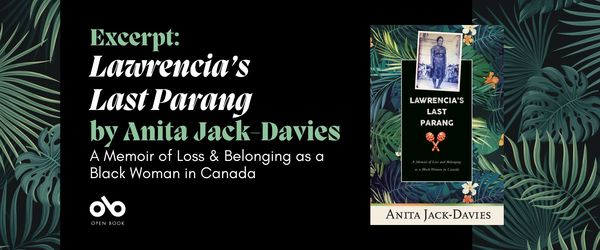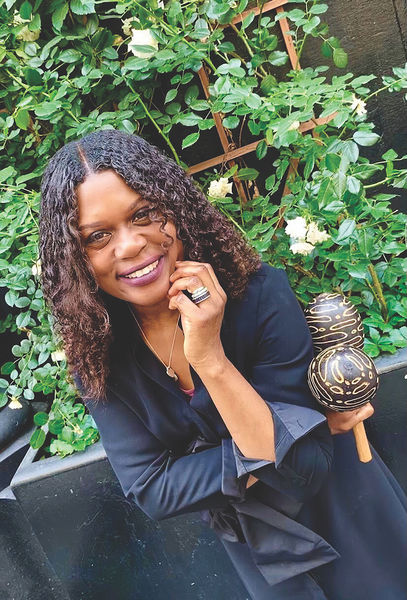Read an Excerpt from Lawrencia's Last Parang, a Memoir of Grief & Racism Alongside Family, Love, & Success
Writer and cross-cultural expert Dr. Anita Jack-Davies was raised by her grandmother Lawrencia, a charismatic, wise, and loving woman who influenced Jack-Davies' open-hearted and curious approach to the world, learning, and educating others. When she passed, when Jack-Davies was herself mother to a five-year-old, it rocked Jack-Davies' world.
In Lawrencia's Last Parang: A Memoir of Loss and Belonging as a Black Woman in Canada (Inanna Publications), Jack-Davies shares a non-linear examination of grief and family seen through the lens of her experiences as a Black woman in Canada, the country of her birth, to which she returned at 12 years old after time spent in Trinidad, and where she obtained her degrees and started a family.
Mimicking a patchwork quilt in format, Lawrencia's Last Parang is a moving, thoughtful, deeply felt examination of race, love, belonging, grief, and family. As Jack-Davies, a mixed race woman, struggles with belonging and acceptance from medical practitioners, her students, and her community, she blends memoir with analysis to create a readable, essential, urgent narrative that showcases the overt and subtle racism present in Canada and the academy. And always at the heart is Lawrencia, casting a spell of strength and courage for both Jack-Davies and readers.
We're sharing an excerpt from Lawrencia's Last Parang today courtesy of Inanna Publications. Here, we are with Jack-Davies as she receives the fateful phone call telling her that her beloved Mami is truly gone, and as she is forced to begin explaining the loss to her own young daughter.
Excerpt from Lawrencia's Last Parang: A Memoir of Loss and Belonging as a Black Woman in Canada by Anita Jack-Davies:
Soundtrack to Lawrencia’s Last Parang:
Music has played an important role in the Jack family, now and ever since we’ve known ourselves. Writing this memoir would have been incomplete without the sounds of Trinidad and the Caribbean broadly speaking. I wanted to bring the reader into the culture of the island and of our home. My hope is that readers will use the YouTube playlist that accompanies each chapter to set the mood and tone for the words on the page. As a lover of music, the soundtrack to this memoir has been carefully curated to reflect specific places and times that are referenced in the text, as well as the music that my family actually played throughout the years.
Track I: PARADISE LOST
Parang: the staged act of merrymaking, music, dance, and food typical of the Spanish Creole community of Trinidad. (Amelia Ingram, 2002)
Soundtrack:
Golpe - Daisy Voisin
Nosotros Tenemos - Daisy Voisin
Good Mother - Jann Arden
Doh Rock It So – Baron
One More Time - Machel Montano
Fire and Rain - James Taylor
I Shot the Sheriff - Bob Marley
Blueberry Hill - Fats Domino
Your CanLit News
Subscribe to Open Book’s newsletter to get local book events, literary content, writing tips, and more in your inbox
On December 6, 2013, I was awakened from deep sleep by a telephone call from my cousin in Boston.
It was 6:00 a.m. I opened my eyes just enough to find the cordless phone on my bedside table. It was Christmas time and we were living in a large house on a country road in Kingston, Ontario, Canada. The table was crowded with lotion, InStyle magazines, a nail clipper, Beats headphones, a water bottle and my Bible. I grabbed the phone on the first ring to avoid waking Kennedy who slept in her bedroom down the hallway, near the guest bedroom, but the network of telephones dispersed in rooms throughout the house announced the caller and made a loud echo that bounced through the foyer’s chandelier.
On the other end of the line she delivered the news. “I’m calling you to tell you that Mami died last night.” Unsure about whether I was dreaming, I searched for words. “No, I spoke with Mami last night and she sounded good... she’s good.” “No, she died last night,” Stacey insisted with an urgency in her voice that registered the certainty of her words. She needed me to hear the truth rather than the fiction that I wanted to believe. Stunned and unable to process what I heard, I was flushed by a feeling of dread. In an instant, I was forced to come to terms with the passing of the mother who raised me even though my biological mother was still alive.
After returning the phone to the emptiness of its base, I relayed the news to my husband. “Mami died last night...” And then I began to wail. I’ve never heard myself cry like that before. The deep bellowing moan escaping my body signalled to the universe that my veil of protection was torn. It was a veil of protection that only became apparent to me once she had passed. Her love was the armour that shielded me throughout my life. I felt alone and afraid, even though Daddy was still alive. I knew that there was still deep snow on the ground outside and the news of her passing made me feel as though someone had stripped me naked and left me to stand alone in the freezing cold. I asked myself how I could live without a mother, especially with Kennedy being so young.
To console myself somewhat, I thought about how all of Mami’s children were healthy: Aunty Marian, Aunty Juliet, Aunty Gemma, Aunty Erroline, Uncle Joseph, Aunty Linda, Aunty Joslin, and Aunty Germine. Minutes later when the sobbing stopped, I reminded myself that I had to be strong for Kennedy, but my body was lifeless. I felt exhausted. There was an emptiness inside my chest, near my heart, a sensation that I had never felt before. I am not sure whether I imagined the pain or whether it was really there. Laying on the bed and looking up at the light fixture in the middle of the ceiling, I recall watching its pewter arms holding six white cups illuminated by its light. My mind was racing. The walls of our bedroom were a green-grey colour. It reminded me of the cement that Daddy mixed in the yard on Saturday mornings when I was six years old. I remember the shade because I had asked the designer from Reid and Siemonsen to help me pick colours for the room that would remind me of being at the spa. I didn’t know then how much I would rely on my bedroom, and the adjacent room that we turned into my closet, for refuge.
On the opposite side of the bedroom was a ginormous bookshelf that filled the length of the wall. It was meticulously adorned with books, encyclopedias, pictures of Kennedy in silver frames, vases with flowers, and an assortment of knick-knacks that we collected over the course of our marriage. The silk curtains that hugged the only window in the room were to my left and parted slightly, which allowed for the dawn light to seep in.
When Kennedy awoke, we sat her between us on our bed. Taking turns, we explained Mami’s passing in the way that adults speak to children about things too difficult for their comprehension. We told her that I would be leaving Kingston in a few days to attend the funeral in Trinidad. At five years old, she looked at me with a mixture of confusion and fear and began to cry. I could not tell if she cried because she knew that I was upset or if she truly remembered who Mami was. Kennedy was only a year old when we took her to Trinidad for the first time in 2009. After returning to Canada, she spoke to Mami and Daddy whenever I called home. I often gave her the phone to say “Hello” towards the end of my conversations. I coached her to tell Mami, “I love you,” and “I miss you,” and Mami would reply in her melodious Trini song, “Yes, Doodo, and I love you too.” I was relieved that we visited Trinidad when Mami was still alive. I didn’t know then that she would be snatched from my life so soon. We hadn’t gone on enough mother-daughter dates. I hadn’t asked her all the questions that I needed to ask. She didn’t hear about my consulting business or about Kennedy attending a French school.
I thought I had more time. Later that day, I milled about the house with Kennedy and made plans for the funeral. I kept the television on in the kitchen and relied on the news coverage to keep my mind occupied on something other than Mami’s passing. The death of Nelson Mandela was on heavy rotation on CNN. Barack Obama was in his second termas president of the United States and had recently delivered a speech on income inequality, which was being critiqued by media pundits across multiple news outlets.
That was well before the coronavirus pandemic of 2020. Well before the entire globe experienced unprecedented loss and grief. Well before COVID-19 and sheltering in place invaded our lives and forced a vigilance around health and safety protocols the world has never seen. I didn’t know then that loss would have taken root, seeking shelter in our bones, our brains, and our genitals, sending millions to an early grave. In Canada, we lost 51,921 lives (Government of Canada, 2023), but the global number was 6.9 million (World Health Organization, 2023). I couldn’t have predicted such anguish and am relieved that Mami did not have to live through it. The news of her death felt like the wretched prank of a pimple-faced teenager on a muggy summer night. I couldn’t think about my future then, paralyzed as I was. But it was the finality of it all that left me feeling desperate.
_____________________________________________________________________
Excerpt from Lawrencia’s Last Parang: A Memoir of Loss and Belonging as a Black Woman in Canada by Anita Jack-Davies, published by Inanna Publications. Copyright Anita Jack-Davies, 2023. Reprinted with permission.
Born in Toronto and raised by her grandmother Lawrencia “Shoon” Jack and grandfather Patrick “PJ” Jack on the Caribbean islands of Trinidad and Tobago, Dr. Anita Jack-Davies is a writer and crosscultural expert. She returned to Canada at the age of twelve and lived in Toronto until graduating from the University of Toronto with an Honours Bachelor of Arts degree in English and Sociology. After obtaining her teaching degree from Western University, the author settled in Kingston, Ontario where she raised a family until 2021 while earning her doctoral degree in urban teacher education from Queen’s University. Dr. Jack-Davies is currently Adjunct Assistant Professor in the Department of Geography and Urban Planning in the Faculty of Arts and Science at Queen’s University. She works as a Management Consultant: Culture and Operations at R/GA, a global marketing firm located in Manhattan, NYC where she now resides with her family.





